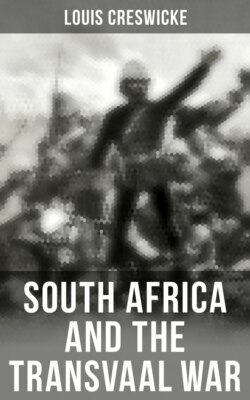Читать книгу South Africa and the Transvaal War - Louis Creswicke - Страница 46
На сайте Литреса книга снята с продажи.
THE FATE OF RAIDERS AND REFORMERS
ОглавлениеTable of Contents
Dr. Jameson, as we all know, was sent with his comrades to England to be dealt with by the laws of his country. He and his officers were tried and convicted under the Foreign Enlistment Act. Much sympathy was shown him by the vast British public, and little for the Reformers, who, whatever their part in the affair, had to suffer most. They endured mental torture, and bodily discomfort of all kinds—discomfort so acute that it brought on some active illness, and caused one to commit suicide. A Judge from the Orange Free State—Judge Gregorowski—who took an unctious joy in the proceedings, was imported to try them, and he revived or unearthed an old Roman Dutch law of treason for the purpose of sentencing them to death. This sentence was fortunately not carried out, but it served to keep the Reformers and all connected with them in a state of agonised suspense. Besides these sufferers from the effects of the Raid, there were others. Mr. Rhodes is said to have exclaimed, "I have been the friend of Jameson for twenty years and now he has ruined me!" The statement was somewhat exaggerated, but there is no doubt that Mr. Rhodes, besides having to resign the posts he occupied, lost much of the sympathy of the Cape Dutch. The Uitlanders, also, who had previously enjoyed this sympathy now forfeited it, all the Dutch being inclined to quote the impulsive act of Dr. Jameson as an example of British treachery, and to look upon Mr. Kruger in the light of a hero. Indeed, many of the British, who took merely an outsider's interest in the state of affairs, laboured under the impression that Mr. Kruger was a simple-minded, long-suffering, and magnanimous person. They did not trouble themselves to go deeply into the incessant annoyances and injustices that for many years had harried the lot of the Uitlanders and caused them at last to lose patience and revolt against oppression. Even now there are people who lean to the belief that the coarse nut of Boer character may possess a sound kernel, people who prefer to hug that belief rather than inform themselves by reading what Mr. Rider Haggard, Mr. Fitzpatrick, and other well-informed men have to say on the subject.
When all efforts to work upon Mr. Kruger failed, the wives of the unhappy men applied to "Tante Sanne," as the President's wife is called, and begged her intervention. She said, "Yes, I will do all I can for you; I am very sorry for you all, although I know that none of you thought of me that night when we heard Jameson had crossed the border, and we were afraid the President would have to go out and fight, and when they went and caught his white horse that he has not ridden for eight years. But all the same I am sorry for you all."
The wives of the Boers are very powerful, and it is possible that Mrs. Kruger may have prevailed in some way over her husband, for at last, after five weary months of imprisonment, after delays, suspenses, and alarms too numerous to be here recounted, the prisoners, on the 11th of June 1896, were released. They were required to pay a fine of £2000, and to sign a pledge not to interfere with politics for three years. It was owing to this pledge that the valuable book, "The Transvaal from Within," which has here been quoted, was not published till affairs therein set forth had come in 1899 to the painful climax of war! Mr. Lionel Phillips, however, was not so wise as Mr. Fitzpatrick. When Sir John Willoughby in 1897 attacked the Reform Leaders of Johannesburg in the Nineteenth Century, Mr. Phillips replied to it in the same Review, August 1897, defending himself and his comrades from the charges made. In consequence of this action Mr. Phillips was considered to have broken his pledge and was condemned by the Transvaal Government to banishment. Doubtless it was without much regret that he shook the dust of that ill-conditioned State from off his shoes.
